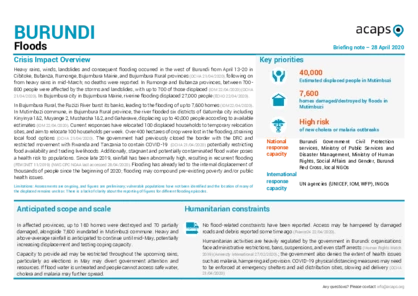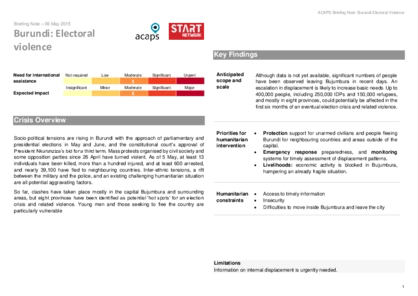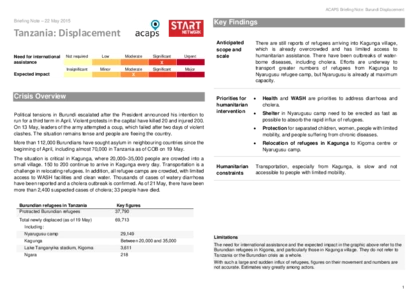Latest updates on country situation
05 January 2026
Democratic Republic of Congo (DRC) forces and the March 23 Movement have been engaged in intensified armed clashes around Uvira town (Sud-Kivu) since early December 2025, triggering large-scale displacement into Burundi. By 28 December, 101,000 individuals from eastern DRC had arrived through the Buganda, Gatumba, and Rumonge border points. Crossings have continued into January 2026, sustaining pressure on reception and transit capacities. The influx is heightening public health, nutrition, and protection concerns in Burundi. Rising food insecurity and limited WASH access are increasing malnutrition and disease risks, particularly among children. Protection incidents include cases of unaccompanied and separated children and heightened exposure to gender-based violence, exploitation, and abuse. Amid a cholera outbreak, insufficient diagnostic capacity, limited inpatient facilities, and weak referral systems are aggravating morbidity and mortality. Humanitarian priorities include improving mobile health and nutrition services, disease surveillance, WASH infrastructure, and decongestion measures at entry and transit sites. (RFI 04/01/2026, RFI 01/01/2026, (Govt. Burundi/UNHCR 28/12/2025, UNICEF 05/01/2025)
02 December 2025
A fuel shortage in eastern Burundi has halted UNHCR partner movements, disrupting services in the Bwagiriza, Kavumu, and Nyankanda refugee camps. Pharmacies are closed, essential medicines have run out, and health facilities cannot function properly. Around 40,000 refugees have been affected, losing access to basic healthcare and essential services. (SOS 27/11/2025, SOS 02/10/2025)
07 October 2025
Food security conditions in Burundi are projected to deteriorate significantly from October–December 2025, with 1.8 million people (15% of the population) projected to reach Crisis (IPC Phase 3) levels, up by 630,000 from August–September. The deterioration coincides with the lean season, when household food stocks are depleted and purchasing power declines. Rising food prices, reduced livelihood opportunities, and further cuts in humanitarian assistance are expected to worsen needs. Macroeconomic instability and sustained inflation will particularly affect the Imbo Plains and Eastern Lowlands, where households depend atypically on market purchases amid below-average incomes. Anticipated La Niña conditions may bring below-average rainfall from October–December, undermining seasonal crop production, while localised flooding and restricted cross-border trade with Rwanda may worsen food insecurity across affected livelihood zones. (IPC 07/10/2025, FEWS NET 01/10/2025)
01 April 2025
By 27 March 2025, over 70,000 Congolese refugees had fled to Burundi to escape conflict in the Democratic Republic of Congo. The influx is straining Burundi’s already limited resources, adding to the 89,000 Congolese refugees already staying in and placing immense pressure on existing refugee sites and transit centres. Arrivals have slowed to 200–300 people per day, but the refugees urgently require shelter, food, medical care, and protection. A cholera outbreak has also been reported in Cibitoke province, exposing the dire sanitary conditions and poor infrastructure in camps. By 29 March, six among hundreds of suspected cases were confirmed. Severe water shortages leave refugees without access to clean water for days, undermining basic hygiene practices such as handwashing. Overcrowding further worsens the crisis, with vulnerable groups, especially children, pregnant women, and breastfeeding mothers, facing the highest risks given the lack of clean water and poor living conditions. (UNICEF 29/03/2025, RPA 17/03/2025, UNICEF 15/03/2025)
25 February 2025
Since January 2025, approximately 65,000 people, including Congolese and returning Burundians, have fled to Burundi from the Democratic Republic of Congo, with over 56,000 needing protection. Most originate from conflict-affected areas such as Bukavu and Goma. Northwestern Burundi faces the strain of arrivals, as many are injured or infected with measles, overwhelming resources amid worsening conditions. (UNHCR 25/02/2025, Reuters 22/02/2025)
03 December 2024
Burundi faces a critical combination of malnutrition and a rapidly escalating Mpox outbreak. Between June 2024 and May 2025, an estimated 484,000 children ages six months to five years are projected to experience acute malnutrition, more than double since 2022. 85,000 are expected to experience severe acute malnutrition, a concerning 44% increase compared to the March 2022 to February 2023 projection. The Mpox outbreak, declared a state of emergency on 25 July 2024, is aggravating the situation. The clade 1b strain is spreading quickly, disproportionately affecting children under five, who account for nearly 30% of the 2,050 confirmed cases. Malnourished children living in areas with inadequate sanitation and limited healthcare are particularly vulnerable, with Mpox mortality rates among children reported to be four times higher than those among adults. The outbreak has further aggravated food insecurity as families divert resources to care for affected members. (IPC 19/11/2024, UNICEF 25/11/2024, WHO 02/12/2024)
23 July 2024
By 13 July 2024, El Niño-induced rains, floods, and landslides had affected nearly 240,000 people in 23 municipalities of Burundi, with more than 49,000 displaced. The floods have extensively damaged 22,000 houses and affected 740 classrooms, 32 health facilities, and 458 water points. Affected people urgently need food, water, sanitation, shelter, household items, and protection services. Those most in need are located around Lake Tanganyika, particularly in the west, north, and east of the country, where especially severe flooding in recent months has caused the lake to overflow. Food security is likely to worsen given the destruction of households’ harvests. These families will continue to need food assistance until the January 2025 harvest season. Countrywide, approximately 1.2 million people are food-insecure; the 120,000 in the Imbo and Congo Nile Ridge livelihood zones whom the floods and landslides have affected the most severely need emergency assistance. (OCHA 18/07/2024, UNHCR 12/07/2024)
current crises
in
Burundi
These crises have been identified through the INFORM Severity Index, a tool for measuring and comparing the severity of humanitarian crises globally.
BDI005 - Multiple Crises
Last updated 31/01/2026
Drivers
Floods
Political/economic crisis
International Displacement
Crisis level
Country
Severity level
3.4 High
Access constraints
2.0
BDI004 - Displacement from Eastern DRC
Last updated 31/01/2026
Drivers
International Displacement
Crisis level
Country
Severity level
2.6 Medium
Access constraints
2.0
BDI001 - Climatic shocks
Last updated 31/01/2026
Drivers
Floods
Political/economic crisis
Drought/drier conditions
Crisis level
Country
Severity level
3.3 High
Access constraints
2.0
Analysis products
on
Burundi
28 April 2020
Burundi: Floods
DOCUMENT / PDF / 452 KB
Heavy rains, winds, landslides and consequent flooding occurred in the west of Burundi from April 13-20 in Cibitoke, Bubanza, Rumonge, Bujumbura Mairie, and Bujumbura Rural provinces, following on from heavy rains in mid-March; no deaths were reported. In Rumonge and Bubanza provinces, between 700-800 people were affected by the storms and landslides, with up to 700 of those displaced. In Bujumbura city in Bujumbura Mairie, riverine flooding displaced 27,000 people.
02 February 2018
Burundi: Displacement from DRC
DOCUMENT / PDF / 980 KB
Escalation of fighting between the armed forces of the DRC and armed groups in South Kivu province, DRC, have caused large population movements in January both internally and across Lake Tanganyika to Burundi. About 7,000 people arrived in Burundi between 24 and 29 January and new arrivals have been reported daily since then.
18 March 2016
Burundi: Electoral Violence
DOCUMENT / PDF / 599 KB
Socio-political tensions are rising in Burundi with the approach of parliamentary and presidential elections in May and June, and the constitutional court’s approval of President Nkurunziza’s bid for a third term. Mass protests since 26 April have turned violent. More than 39,000 have fled to neighbouring countries. Inter-ethnic tensions, a rift between the military and the police, and an existing challenging humanitarian situation are all potential aggravating factors.
18 March 2016
Tanzania: Displacement from Burundi
DOCUMENT / PDF / 487 KB
Political tensions in Burundi escalated after the President announced his intention to run for a third term in April. Violent protests in the capital have killed 20 and injured 200. On 13 May, leaders of the army attempted a coup, which failed after two days of violent clashes. The situation remains tense and people are fleeing the country.





